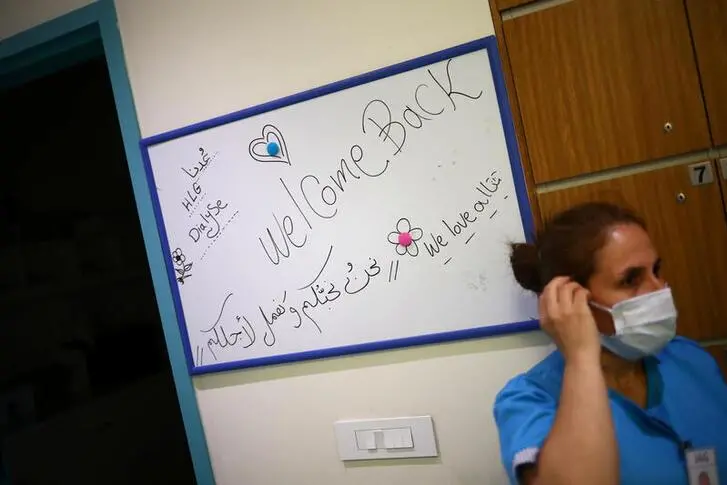PHOTO
Violence has not been limited to medical workers, with a child kidnapped from his mother and organized armed gangs running riot in various regions.
The Syndicate of Hospitals in Lebanon said it fears that hospitals could become a “punching bag” for a frustrated populace struggling through the economic crisis.
Doctors have claimed that several of the security incidents relate to rising hospital bills.
Other incidents have seen Lebanese attempting to claim their rights by force, such as obtaining an unavailable bed in a hospital or claiming a cash deposit held by the bank.
Among the capital’s hospitals, Al-Makassed endures attacks on the medical, nursing and administrative staff more than any other, particularly in the emergency department.
The hospital administration said a few days ago that the attacks were committed by “barbarians who are insulting, beating and threatening the ER doctors in an unexpected way.”
The hospital has closed its ER until the medical body is provided with security.
Less than 24 hours after a violent outbreak in the Beirut hospital, the same scenario took place in Sheikh Ragheb Hareb University Hospital in Nabatieh, where Hezbollah and the Amal Movement are extremely powerful.
Vandals smashed up the ER department and medical staff were beaten while attempting to care for a patient.
The cameras showed the parents of the patient and the nursing staff quarreling, which escalated into fighting, resulting in a number of injuries and the destruction of some medical equipment.
The parliament enacted a law on Jan. 5 “to strengthen the legal protection of doctors, their assistants and hospital personnel and to impose penalties, including imprisonment, on the abusers of hospital edifices and the workers thereof, causing serious moral and material damage.”
The attacks have also hit private doctors.
Two days before the incident in Nabatieh, dentist Elie Jasser was stabbed to death in his clinic, a shocking crime that shook the Lebanese public and sparked an outcry on social media.
The suspect, arrested by the security forces, is a soldier who was reportedly angry that Jasser did not effectively cure his fiancée’s pain.
Dr. Khaled Al-Soloh, head of the Dental Association in Bekaa, said: “This pre-meditated crime reflects the absence of law and the decomposition of the state that abdicates its responsibility to protect doctors who have become a ‘punching bag’ for anyone.”
Dr. Charaf Abou Charaf, head of the Lebanese Order of Physicians, said attacks against medical institutions had increased in the past year-and-a-half.
“Hardly a week goes by without a doctor being subjected to verbal or physical abuse. This does not encourage doctors to stay in Lebanon, but rather to immigrate.
“Around 3,000 doctors have left Lebanon out of 15,000 doctors registered in the syndicate,” said Abou Charaf.
Abou Charaf added: “There’s a law that protects the health sector in Lebanon and criminalizes the perpetrator that should be enforced. The courts cannot release a perpetrator after their arrest. Things cannot continue like this.
“There’s no social protection, no security, and the income is low.
“We know the general situation is hard for everyone, but does that mean that things are allowed to spiral out like this? The state must be powerful in order to deter the assailants.”
He added: “What we are witnessing today did not happen during the civil war. Medical equipment, medicine and beds for patients were available and people had money. The situation today is very difficult.”
Violent crime has taken a new turn in Lebanon as it continues to be rocked by the mounting economic crises.
Robberies from cars, shops and pickpocketing continue, with abductions for ransom becoming prevalent.
On Thursday night, Interior Minister Bassam Mawlawi announced that Rayan Kanaan, a child who was kidnapped on Wednesday, had been freed by the security forces.
Kanaan was grabbed by two people in a car while he was with his mother in a market in Halat in the Byblos region. They reportedly requested $250,000 in return for his release.
Mawlawi said that significant efforts were made by the Information Division of the Internal Security Forces to safely return the boy to his family.
The announcement, however, did not disclose any information on the kidnappers and whether they were arrested or ran away before the arrival of the security forces.
The captors had reportedly fled with the youngster to a place in the Baalbeck–Hermel region — an area of influence for Hezbollah that shelters armed gangs.
Meanwhile, on Friday, a court released Abdallah Al-Saei, who was arrested last month after he held the employees of Bank of Beirut and the Arab Countries hostage in a branch in the city of Jeb Jannine.
He threatened to burn down the bank if he was not allowed to withdraw his savings amounting to $50,000.
He obtained his money, gave it to his wife and eventually surrendered to the police.
The court released Al-Saei and allowed him to keep his money.
He was asked to apologize to the bank’s employees after the confrontation.
Also on Friday, residents of the border town of Al-Qaa protested against the scourge of thefts and other offences.
They said: “Do not let us resort to weapons to defend our land.”
The mayor of Al-Qaa, Bachir Matar, said that the gangs responsible for the robberies are located on the border between Lebanon and Syria.
The gangs benefit from the illegal crossing points that usually belong to Hezbollah, the mayor added.
Matar said that the gangs are a mix of Lebanese and Syrians. “In light of our protest, the army is carrying out patrols. However, Syria should control its borders.”
Copyright: Arab News © 2022 All rights reserved. Provided by SyndiGate Media Inc. (Syndigate.info).





















